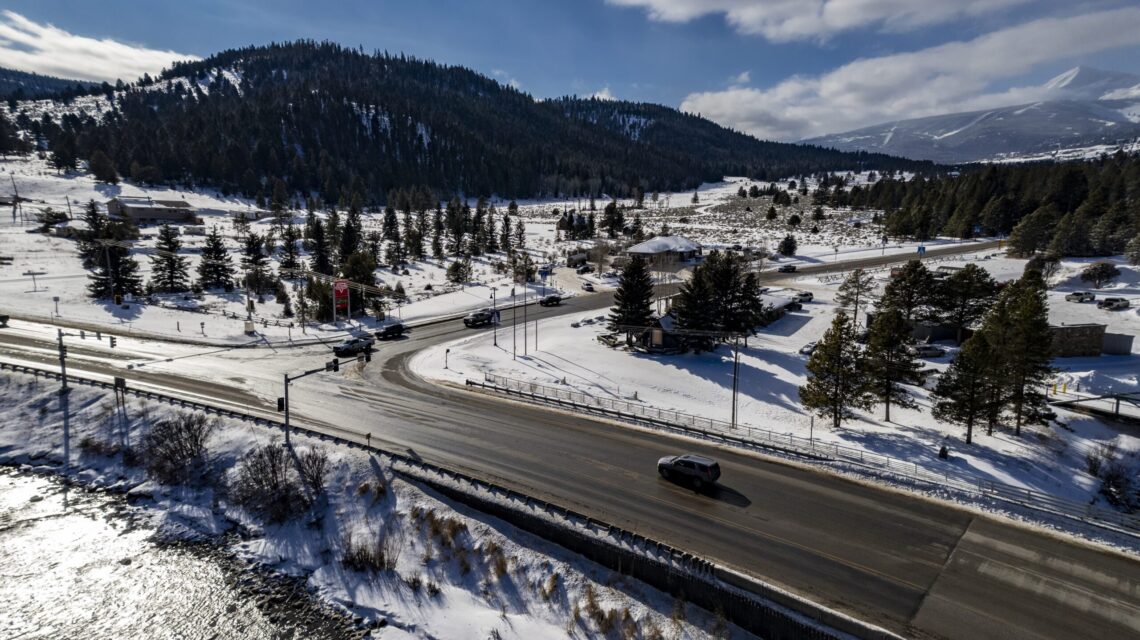Funding requests rise from government service providers, resort tax collections remain sluggish
By Jack Reaney ASSOCIATE EDITOR
Editor’s note: In correction to the language used in this story’s headline, the initiation of a buy-sell agreement does not guarantee the transaction. The agreement specifies a closing date on July 1, 2024, and certain terms, conditions and contingencies must be met or remain intact before the eventual closing.
During Wednesday’s Big Sky Resort Area District board meeting, members voted unanimously to sign a buy-sell agreement for a parcel of land that will allow the Montana Department of Transportation to construct improvements at the intersection of U.S. Highway 191 and Montana Highway 64 (Lone Mountain Trail).
Negotiations have been ongoing since February between BSRAD and the selling party, which maintained that the property price is valued at $10 million. However, the seller did agree to provide a small discount if BSRAD accepts its financing terms versus more costly options (page 36) through First Security Bank.
The board opted for the seller’s financing scheme (page 17), which discounts the land to $9.05 million, but includes an additional $1.4 million in total interest and financing charges.
In past meetings, BSRAD board members and Executive Director Daniel Bierschwale have emphasized the importance of acquiring the land now, while it’s available, to improve the flow of daily commuter traffic. In a January interview, Bierschwale and engineers with MDT discussed the possibile improvements if the land was purchased—including a roundabout.
Now, the land will be owned by the Big Sky community, purchased using resort tax revenues and reserves. David O’Connor, executive director of the Big Sky Community Housing Trust, gave public comment in favor of owning community land.
“This is a big investment for our community,” O’Connor said. From his housing trust role, he said Big Sky is unique because “we don’t have as a community, any land assets. So many communities are leveraging community-owned land to address their housing concerns, for example.
“So, while this is a big hit, and this is gonna be definitely impactful on organizations for the next couple of years, I think it’s the right thing to do.”
O’Connor said it’s a regrettable reality that the Big Sky community did not purchase more of its own land in the past, especially when it was more affordable.
“It’s a big hit. But I think it’s smart money for us to spend,” O’Connor said.
The purchase includes commercial leases for buildings on the property. Stillwater Architecture and Christy Sports were named as businesses operating in the vicinity of the intersection, and those tenants may need to be removed at some point for intersection construction. Christy Sports’ lease would not expire until November 2026, and includes two five-year options after that.
“But the seller is working with us, and working with Christy Sports, to see if there’s an alternative where the seller could move the tenant to a different location,” BSRAD attorney Kim Beatty explained. “… You just need to know that, if you purchase this [property], you do purchase it subject to the seller’s obligation under each of the leases.”
Board member Kevin Germain expressed concerns about the longevity of those leases, but Board Chair Sarah Blechta said they feel confident that the timing will not pose a significant threat to intersection construction.
Expenses mount as collections drop
This year, BSRAD is facing a resort tax revenue shortfall of nearly $3 million.
On Wednesday, board members faced an action item to approve the fiscal year 2025 budget, its total based on projected collections in fiscal year 2024.
Forecasted 2024 collections were $23.6 million, but eight months in, the projection is trending toward roughly $20.8 million.
Blechta said BSRAD collections have been down for five of the eight months.
“So I would like everybody in this community to understand, we are consistently down at Resort Tax this year,” Blechta said. “Despite being consistently up in requests.”
The 2025 budget includes $4.99 million in debt service for the 191/64 intersection. BSRAD would pay the remaining $2.74 million in 2026, and $2.72 million in 2027.
However, Bierschwale recommended that this year, BSRAD deploy its entire capital reserve of $4 million to cut into the first year of debt service, which would reduce the total debt for fiscal year 2025 to $991,000 for the 191/64 land acquisition.
Blechta gave credit to board member Ciara Wolfe for asking an important question:
“What happens if we completely drain the capital reserve, don’t put any money back into it, and then something else comes up that’s really, really important that we couldn’t otherwise have done,” Blechta said.
Even after exhausting capital reserves, BSRAD would still have $2.5 million reserved for high-stakes emergencies.
Wolfe emphasized that capital reserves have provided flexibility and opportunities in the past. She also suggested that if capital reserves are deployed to limit this year’s “hit” from the 191/64 intersection purchase, BSRAD should also budget to pay off more of the remaining $6.45 million.
“For me, it feels healthier to wean… Just because you’re saving some this year, are you just putting off the harder decisions [until] next year,” Wolfe asked. “… Don’t just try to make this year the easy year, because it’s gonna be hard no matter what to acquire this parcel.”
Wolfe did not vote—being the final session in her term as a Resort Tax board member—and the remaining board voted unanimously to approve the budget as originally proposed.
Bierschwale pointed out that BSRAD is being careful to keep its own operational costs down in a tight budget. Last month, Office Manager Sara Huger left her role and BSRAD opted not to fill her position, to cut operational costs.
“We have a solid team right now with high performers, and we’re gonna use ‘em,” Bierschwale said.
BSRAD asks government service providers to improve forecasting
As part of a three-year cycle, BSRAD funds operational costs for government services including fire, water and sewer, parks and trails, transportation, law enforcement and public school. BSRAD also funds one-year capital requests. Board members expressed disappointment with forecasting, particularly for capital requests.
In last year’s forecasts, none of the districts forecasted funding requests for capital projects. However, actual requests totaled $910,000 (page 39)—the Big Sky County Water and Sewer District listed three projects, $535,000 in total, and the Big Sky School District an additional $375,000 for teacher and staff housing.
Providers also forecast three-year operational costs, funded by BSRAD to offset local property taxes.
In total, the government service providers requested $4.5 million for operations, but had forecasted only $3.28 million.
“There was a very significant amount of things that were not forecasted from some of these entities. And that can create a huge issue across the community,” Blechta said.
“We’re setting budgets based on your forecasts,” Bierschwale said.
The board was especially surprised by the extent of requests from the water and sewer district.
“Up until two years ago, no resort tax went to water and sewer. And you guys were on your own,” Kevin Germain said. “And then we sat down and negotiated a wonderful agreement over the construction of the new plant. And now fast forward to today, you guys are in here with huge asks… To me, it’s pretty troubling on the trend that we’re setting.”
BSCWSD representatives explained that costs have skyrocketed, unforeseen repairs have emerged, and litigation against the district has cost $2.1 million in the past few years, depleting their cash reserves despite the district winning every case thus far.
Ciara Wolfe asked how much those legal fees are costing each customer, and Smith said it equates to roughly $600 per year for each ratepayer.
The district does plan to increase user rates to offset need for resort tax funding.
“Our ask here is to soften the blow to the ratepayers. The blow is not going to be soft, because the rate increases over the next four years are going to be shocking,” said Terry Smith, BSCWSD finance officer.
BSRAD will make actual funding decisions based on government service requests, at the Madison-Gallatin Joint County Commission meeting on May 8 in Big Sky.












